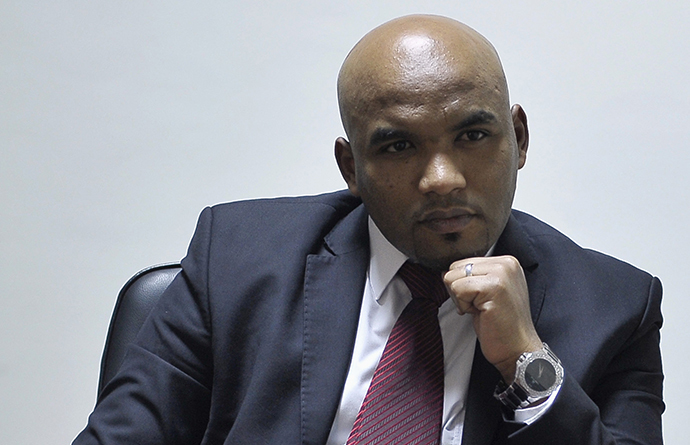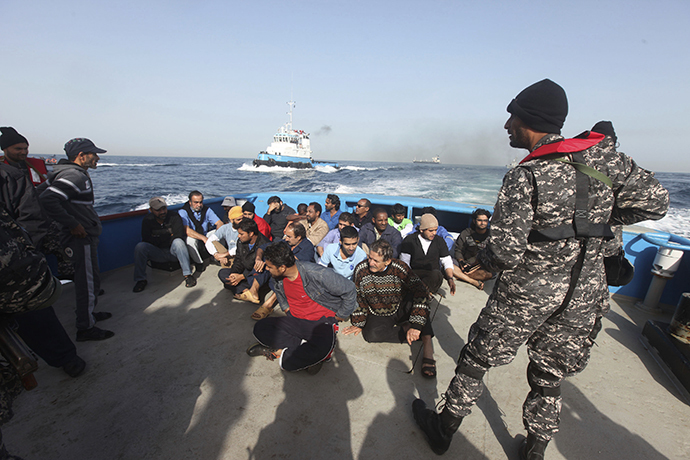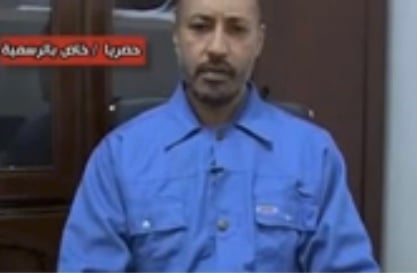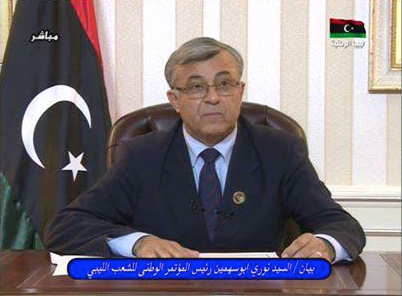Libyan rebels agree to end eastern oil ports blockade within days
Rebel forces in eastern Libya have agreed with the government to soon end its months-long blockade of oil export ports, according to a senior leader of the group.
“The oil port issue will be solved within days,” Abb-Rabbo Al-Barassi, self-declared prime minister of the rebel fighters, toldReuters.
Reuters added that the group’s leader, former anti-Gaddhafi war commander Ibrahim Jathran, told a rebel television station that the group would end the blockade and encourage dialogue “with all Libyans.”
Jathran’s group has seized three major oil exporting ports - Ras Lanuf, Es-Sider, and Zueitina - in the impoverished east of the country since August 2013.
In early March, the rebels started exporting oil from the port of Es-Sider. The first shipment was sent on a tanker known as Morning Glory, which was flying the North Korean flag.
The move resulted in Libya's parliament sacking Prime Minister Ali Zeidan, who fled to Germany. Libya prepared military forces “set up to liberate the ports and end the blockage,”saidparliamentary spokesman Omar Hmeidan, and to retrieve the US$38 million worth of oil seized in Morning Glory, which is thought to belong to Saudi owners.
Rebels called any attack a “declaration of war.”
"We have sent land units to defend Cyrenaica to the west of Sirte...and we also have boats patrolling regional waters," Essam al-Jahani, a senior militia chief, told Reuters.
Days later, US Navy Seals boarded and took control of Morning Glory. The operation, approved by US President Barack Obama, came at the behest of the Libyan and Cypriot governments. No injuries during the seizure were reported. The ship was eventually returned to Libyan authorities.
The overall blockade of export routes has shrunk Libya’s exports from 1.4 million barrels per day a year ago, to just 230,000 barrels per day.
The rebel port campaign was initially an attempt by rebels in eastern Libya to claim a larger share of wealth from the country’s rich oil reserves.
As time passed, the blockade became a battle for independence, as separatist groups have called for a division of Libya into three regions, based on tribal boundaries.
The Libyan government has little control over the whole of the country, as ex-rebel commanders, former exiles, Islamists, tribal leaders, and federalists all vie for positions in the vacuum.
The lack of consistent state military operations has empowered rival militias, which form a mix of security forces and “quasi-official military units.”
"Really there is no army, I thought there was one, but then I realized there really isn't any," former premier Zeidan said from Germany, according to Reuters.
Various militias say they are simply providing local security until the government can strengthen.
But control of oil is crucial to establishing authority over Libya, as it provides more than 90 percent of foreign income to the country, which has the biggest reserves in the whole of Africa.
"There was a euphoria that accompanied the overthrow of the dictator that did not take into account some of the stark realities...What is the unifying idea here?" a Libya-based Western diplomat told Reuters.
From Europe, ousted Zeidan has called Libya a potential base for stateless terror groups looking to exploit divisions, as in Afghanistan.
"Libya could be a base for Al-Qaeda for any operation to Italy, to Britain, to France, to Spain, to Morocco, to everywhere. Weapons are everywhere, ammunition is everywhere," Zeidan told UK newspaper The Times while meeting with British politicians in London.
"My plan is to struggle to reform the state, to stabilize the situation,” he said.
Libya Herald.......

Abu Sahmain comes out fighting, blames Awami for release of Jadhran tanker prisoners
By Muttaz Mohamed Ali.
Tripoli, 2 April 2014:
Embattled Congress President Nuri Abu Sahmain has said that he has no plans to resign. Instead he has tried to focus attention on the controversial decision by the man who would effectively replace him if he were forced from office, First Deputy President of Congress Ezzidden Al-Awami, to release the three Libyans caught aboard the oil tanker Morning Glory.
Speaking on Al Nabaa TV this evening, he said that Awami had taken the decision against his own advice that it was up to the Attorney General to decide.
“While I was in Kuwait attending the Arab Summit, I received a phone call from the First Deputy President Ezzidden Al-Awami, telling me that the Attorney General had been in contact with the GNC asking for permission to release the armed people. I answered him that this was responsibility of the Attorney General and that the General National Congress had nothing to do with it.”
The aim, he said, was probably to “finish the oil ports crisis which is something we all supported”. But it was for Attorney General to decide, not Al-Awami, he said.
Congress members yesterday told the Libya Herald that there was now consensus to sack Abu Sahmain following the publication of a video in which he admits that he was taken in for questioning by a militia at the beginning of January over the presence of two women at his house. He had previously denied being arrested.
Both the video and the incident are under investigation by the Attorney General although it appears that many members of Congress are more concerned about the suggestion of immorality rather than the idea that Abu Sahmain may have lied.
Cyrenaican ‘government’ claims provisional deal with Tripoli
By Hadi Fornaji.
Tripoli, 2 April 2014:
The self-declared “Cyrenaican government” is claiming that a provisional deal has been reached with the government in Tripoli that would allow “most” of the blockaded eastern oil ports to be reopened.
According to Ali Al-Hassi, the spokesman for Ibrahim Jadhran and the Cyrenaicans, the government delegation led by Deputy Finance Minister Muraja Ghaith broadly accepted their demands during negotiations today in Brega. Both sides, he said, had shown “good intentions” in the talks. The government team had then left on a private plane back to Tripoli to report the discussions to the Prime Minister and a reply was expected within 48 hours. “Maybe tomorrow”, said Hassi.
He also denied reports that there had been a specific deal to reopen Zueitina terminal in the morning. Everything would depend on the government. “A big part of the oil ports would be reopened if the government accepts our demands,” he told the Libya Herald. Asked which ports, he replied cryptically “most”.
The Cyrenaican demands, he explained, were the formation of a committee to oversee the loading of oil in future with counting devices in operation; a committee to investigate past oil loadings; a distribution of oil revenues on a federal basis – to Tripolitania, Cyrenaica and Fezzan as per the 1951 constitution; international organisations to inspect what is happening in Libyan prisons; and the return home of displaced persons.
The first two are known to pose no problem for the government, and the last is not expected to raise objections other than in Misrata. Nor probably is the inspection of prisons. The sticking point has been dividing the oil revenue.
Hassi’s statement that “most” ports could reopen appears to indicate that Jadhran and the Cyrenaica federalists intend to keep one closed to pressurise the government into conceding further demands, among them possibly that Jadhran should be put in charge of the Petroleum Facilities Guards.
Any decision to do a deal with Jadhran, let alone concede his demand for splitting oil revenue on a federal basis is likely to meet with stiff opposition.
“It is not possible for the government to sign a deal with Jadhran”, a senior official at the Ministry of Defence told this newspaper today. “He is a wanted person” who had to be arrested, he said.
LIA now suing Societe Generale over losses and fraud
by Libya Herald reporter.

London, 2 April 2014:
In what appears to be an accelerating drive to recover funds lost through alleged fraud and professional incompetence by international financial institutions, the Libyan Investment Authority is suing France’s Societe Generale in the High Court in London for losses of $1.5 billion.
The case, launched in the Queen’s Bench Division Commercial Court, revolves around claims that Societe Generale’s securing of a series of derivative trades between 2007 and 2009 worth a total of $2.1 billion, involved a payment of a minimum of $58.5 million to Panama-registered company Leinada. This sum was apparently for advisory services.
The LIA is claiming that the money was in fact a bribe that was funnelled through the Panamanian company to close associates of Saif Al-Islam. The French bank has said that the claims are groundless and will be contested. The LIA also maintains that the derivatives positions that SocGen took for it suffered heavy losses of up to $1.5 billion. It wants the trades declared void and compensation for the loss.
There are similarities between this court action and a claim launched in January, again in the British High Court, against US investment bank Goldman Sachs for catastrophic losses on complex derivative investments which nevertheless netted the bank hefty fees. An entire $1 billion derivative investment was lost but, one way or another, Goldman earnt $350 million from the trades.
The Securities and Exchange Commission and the Department of Justice in the US are currently looking at a number of other allegations that spurious payments were made to middlemen or officials. These were in return for the LIA’s award to US financial institutions of mandates for extremely large investments. In its London claim against Goldman Sach’s, the LIA has maintained that the inexperience of LIA investment officers and risk managers was “exploited” in these deals.
Last month, US hedge fund Och-Ziff filed that it was being investigated by the Justice Department for Libyan-related deals and faced an impact of its earnings.
Arson attack destroys Tawergha Local Council office in Tripoli
By Jamal Adel.
Tripoli, 2 April 2014:
Fire destroyed the offices of the acting Tawergha Local Council at the Falah Road camp in Tripoli on Monday in what the council leader Abdurrahman Shikshak says was a deliberate attack.
“It is not possible to say that the fire was a mere coincidence,” Shikshack told the Libya Herald. “The fire was deliberate. Bullets were heard around in the area, then the fire started,” he said.
“It destroyed all the office documents and burnt the only clinic equipment in the camp,” he added.
The women’s association office and two cars were also destroyed.
It is not the first fire at the Falah camp, home to some 350 families. In January, 18 units housing 53 people burnt down, although that was believed to be the result of an electrical fault.
The official authorities have responded to Monday’s fire, said Shikshak. “The Social Affairs Ministry and a representative from the Interior Ministtry came and officially documented the incident.”
He added: “We are in urgent need for basics, food and medical supplies. The Social Affairs Ministry is doing its best. But it is insufficient, I’m afraid.”
Sebha bank killing sparks nationwide strike
By Jamal Adel.
Tripoli, 3 April 2014:
The killing of a Jumhouriya Bank staff member in Sebha has triggered a nationwide strike by employees demanding better security
Salim Abubaker Al-Qaddafi was shot dead yesterday morning in front of the Jumhuriya Bank in the southern city by gunmen who then fled.
“Some men came to the bank in morning and asked about the victim Al-Gaddafi and then went out. A few minutes later the victim arrived but the gunmen were waiting for him outside. They opened fire and shot him dead, and fled,” Jamal Al-Zaroug, a fellow member of staff at the Sebha branch of the Gumhouriya Bank, told the Libya Herald.
“For more than seven years, Al-Gaddafi was one of the best and hardest-working employees [at the bank],” Zaroug added.
The murder of Al-Gaddafi is said to be political. Although a member of the Qaddafa tribe, he supported the revolution from the beginning, to the anger of other local tribe members. This is believed to be the reason for his death.
Immediately after the killing, Sebha staff went on strike in condemnation of the murder. “We are on strike for three days, expressing solidarity with the victim and condemnation of this incident,” said Al-Zaroug, insisting: “We must have had a better security protection as employees at the Gumhuriya Bank.”
Other banks in Sebha and elsewhere in the south are also on strike both in sympathy with the victim and demanding better security.
Today, a partial strike spread to Tripoli. There were protests in Martyrs Square outside the bank’s head office. It was impossible to stop all work but colleagues would not be serving the public, said one employee.
The strike is expected to continue tomorrow.
The bank’s chairman, Musbah Alkari, is expected to meet with the strikers tomorrow to discuss what can be done to improve security.
Saadi claims contacts with Jadhran; Jadhran
denies it
By Libya Herald staff.
Tripoli, 1 April 2014:
Saadi Qaddafi has said that he had been in contact with the de-facto head of the Cyrenaica federalists and oil terminal blockader Ibrahim Jadhran to sell Libyan oil on the international market and secure weapons and equipment for himself and his supporters.
In a second televised video statement aired last night, Saadi named a number of intermediaries between himself and Jadhran. He also admitted that he was behind the attempt to destabilise security in January when Qaddafi supporters took over the Tamenhint airbase in Sebha.
Today, Jadhran issued a statement on his Barqa TV vehemently denying any relationship with Saadi. He said he would not have wanted to be in touch with someone who had fled the country even “before his own sister did so”. He indicated that he would sue those responsible for the video broadcast.
In his statement from Hadba Prison where he and other top Qaddafi regime figures are being held, Saadi said he had had “extensive calls” while in Niger with Jadhran and that there had been meetings between him and his own intermediaries.
There had been a hiatus at one point when relations broke down but then the Skype calls continued again, he claimed.
He said there were also contacts with Tebu officials.
He said he had told Jadhran to take over Sirte which would then become “the front Line of Cyrenaica”, and that he himself would find companies to buy oil and “we share the profits”. Jadhran had agreed and had said that he would protect families in Sirte wanted for being Qaddafi loyalists. As a result, Saadi had contacted companies “in Turkey, Tunisia, Lebanon and Malta”. Some, however, had expressed fears about entering Libya’s territorial waters.
He also claimed that Jedhran had been put in touch with pro-Qaddafi contacts in Fezzan.
It is unclear whether Saadi was speaking freely or was prompted in his claims.
Congress President Abu Sahmain expected to be
axed
By Hadi Fornaji.
Tripoli, 1 April 2014:
Members of the General National Congress (GNC) have told the Libya Herald that there is now consensus to remove the President, Nuri Abu Sahmain. There had been growing demands in Congress that he resign over a video circulating on social networks in which he admits to an incident which he had been previously denied.
In the video, Abu Sahmain was filmed without his knowledge discussing the incident that took place on 3 January when a group of gunmen forced their way into his Tripoli house in which there were two young women unrelated to him and then took him off for questioning.
“Removing Abu Sahmain is the main topic of discussion,” sources in Congress said today.
“We will change him”, a congressman who asked not to be named told the this paper, adding that Congress members were still angrily discussing the video.
Another, also speaking on a condition of anonymity, said that some Congress members were not opposed to Abu Sahmain remaining in office but that he should not chair sessions while the Attorney-General was investigating the incident.
If Congress votes to remove Abu Sahmain, the first Deputy President Marj Congressman Ezzidden Mohamed Younis Al-Awami automatically takes over. But he too is in hot water over the order to release the three Libyans captured on the Morning Glory tanker. According to sources at Congress, the Attorney-General received a letter from Al-Awami as First Deputy instructing him to release them. It is widely accepted that, if true, Awami did not have the right to make such an order.
Reports that there is consensus in Congress to appoint Omar Sulaiman al-Hassi as Prime Minister have been rigourously denied by all members spoken to. ”There is no consensus,” said one.
Staff at Attorney General’s office condemn release of oil tanker federalists
By Ahmed Elumami.
Tripoli, 31 March 2014:
Staff members at the Attorney General’s office have condemned the decision to release three Libyans involved in the Morning Glory oil tanker case.
In a statement posted on the official Facebook page of the Attorney General’s media office, staff members claimed that the Attorney General, Abdulqader Radwan, had made the decision from a Tripoli hotel room, without consulting the case file or the investigator.
Staff said they were concerned to learn that the release came in response to pressure from some members of the General National Congress (GNC) and the government. The GNC and government, they said, pretended to keep political conflicts away from the judiciary but this was clearly not the case.
The statement also called for Radwan’s resignation. Staff members said he did not practice justice as required and said that they could no longer work with an Attorney General who wasted the Libyan people’s wealth.
“We saw that the international community was much more concerned about the wealth of the Libyan people more than the Attorney General” the members said. “After this, how can we can trust him to do the right thing in criminal cases?”
Three Libyans from oil tanker drama to be
released by Attorney General
By Ahmed Elumami.
Tripoli, 31 March 2014:
The three Libyans who have been accused of forcing the captain and crew of the Morning Glory to sail away from Libya at gunpoint with a shipment of illicitly-obtained oil are to be released from prison.
The Attorney General Abdulqader Radwan yesterday announced that the three federalists who were involved in the illegal oil sale from Sidra port would be released. They were caught on the vessel off the coast of Cyprus by the US military and returned, with the tanker’s crew.
A source close to the office of the Attorney General told the Libya Herald that the main reason for the decision was because of demands made by some elders from Ajdabiya in particular and from the eastern cities in general. A number of members of the General National Congress (GNC) had also put pressure on Radwan, the source said, to help the country move towards a peaceful solution to end the oil crisis.
The move is believed to be part of ongoing negotiations between the government and Ibrahim Jadhran who is leading the blockades at three eastern oil ports.
However, the decision has not been well-received by all. Deputy Minister of Defence, Khaled Al-Shierif, expressed his anger in a post on his Facebook page.
“The three armed people who were being brought to justice have been released even before our men’s feet have dried from sea water” Shierif said. “I do not know why our men went on the back of boats with their simple weapons battling waves and risking their lives to try and prevent the tanker from escaping.”
He added that there seemed to be a higher power at work than justice, that was not fully understood.
The multi-national crew of the Morning Glory are yet to be released. The source said that the procedures to deport the captain and crew from the vessel were ongoing, with co-operation wit related embassies.
However, one diplomat said that the embassies were being kept in the dark. “We don’t know what’s happening. We are trying to find out,” he said.





No comments:
Post a Comment